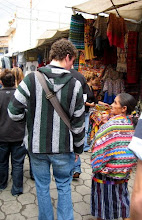Update: A NY Times article on the elections as they likely head into a runoff: http://www.nytimes.com/2009/10/26/world/americas/26uruguay.html?_r=1
The Candidates:
1. Jose (Pepe) Mujica: Pepe is the leader of the "Frente Amplio" (Broad Front), a very diverse coalition ranging from the conservative Christian Democrats to the much more liberal socialist & communist parties. He was a guerrilla fighter under the dictatorship, and one of the most frequent objections I hear from people who don't want to vote for him is "He killed people." This is interesting to me, since it seems so important to so many in USA elections to vote for somebody who has been in a war. Though I haven't seen a lot of poll breakdowns on these lines, judging by the neighborhoods I've been in and people I've talked to, Pepe is much more widely supported among the "clase obrera" (working class, blue-collar lower wage) then the middle and upper classes, though there are obviously exceptions. Pepe is leading all polls, but if he doesn't win 51% of the vote there will be a run-off between the top two candidates in November, and most analysts and Uruguayans seem to think it would be hard for him to attract many more votes in that runoff.
2. Lacalle aka Qki ("cookie"): Lacalle was president a few terms ago and is running again with about 35% in the polls. He's the candidate from the "blancos," one of the two historically dominant parties. I don't know that much about him, though he is most likely to win if the election goes to runoff. He has a bit of a reputation among some people I've talked to of being a bit secretive or potentially corrupt from his last term, but I really don't know much about the truth of those claims.
3. Pedro Bordaberry: Pedro is the candidate from the "colorados," the other historically dominant party and 15% in the polls. He's the son of the former dictator (now in jail), but as one of my classmates told me (a supporter of Pedro), "He's got a lot of baggage because of that, but he's completely different" than his dad. Pedro doesn't have any real shot at the presidency, but will probably get a few representatives in congress to be a minority opposition voice or an important part of any potential coalition government.
4. Other Issues: So these aren't candidates, but there are two other important issues on the ballot today.
A. One is whether or not to allow Uruguayans living outside the country to vote. Up to 10% of Uruguayans left the country during the dictatorship and few have come back, so those outside the country have a pretty big potential voice. One of the fears I've heard is those ex-pats will vote in place large taxes that they aren't affected by, not realizing their ramifications.
B. The other is whether or not to annul the "ley de capucidad," a law that says the executive power must approve any judicial proceedings on crimes from the dictator era, which essentially becomes general amnesty for all crimes on either side during that era. Just like in every other country where this law has been debated (Argentina is the only one to annul so far), the debate is between whether it's worth it to open these old wounds & isn't it time to just move on, or whether the principle of allowing the executive branch to un- constitutionally check the judicial branch on this issue sets a principle that influences the culture negatively, both not giving closure to the families of the missing and showing that some people aren't accountable for the crimes they commit. It's a difficult issue, and needs 50% + 1 vote to pass, and latest polls were in the mid 40% with 10-17% undecided.
The Electoral System
This system is quite a bit different from that in the USA, as voters don't vote individually for each open seat, but instead vote a party's "list." Each list has the same president/vice-president combinations (that's set in stone), but then for each president/vice-pres combination there are seemingly endless options for the various representatives, etc. However, all these combinations are still within the same general party, so it is impossible to vote for a senator from the colorados and Pepe for president, as they would never be found on the same list. The vote is also obligatory here as in most Latin American countries (or you have to pay a $100 fine), though you do have the option to vote blank -- not choose. Voters from the interior of the country living in Montevideo have the option to re-register to vote here, or, as many do, go back home for the weekend to vote.
Idiosyncrasies
As in many areas of life, Uruguayans are passionate about their candidates, and spend hours in the streets waving their flags, handing out their lists, and blaring their horns and music. It's a semi-party, semi-annoying atmosphere way different than anything I've seen in the U.S. Candidates were officially required to close their campaigns 48 hours before election day, but supporters were still strong in the streets, waving the flags and blaring the cumbia (since they can't play official campaign music in the last 48 hours), and honking at others waving the same flags. Surprisingly, today it's really quiet. Everybody going out to vote, but no more party style campaigning. Beside the 48 hour ban on candidate speeches and campaigning, restaurants and stores were no longer allowed to sell alcohol after 8pm last night, apparently in an effort to keep people from dancing all night until 6am (as is usual for Saturday night) and showing up to vote with a less-than-clear mind. A somewhat interesting rule in my opinion, especially since it's always possible to buy earlier in the day and save until that night.
I think that's most of the differences I've noticed, I'll keep you posted on the results once they come in!
